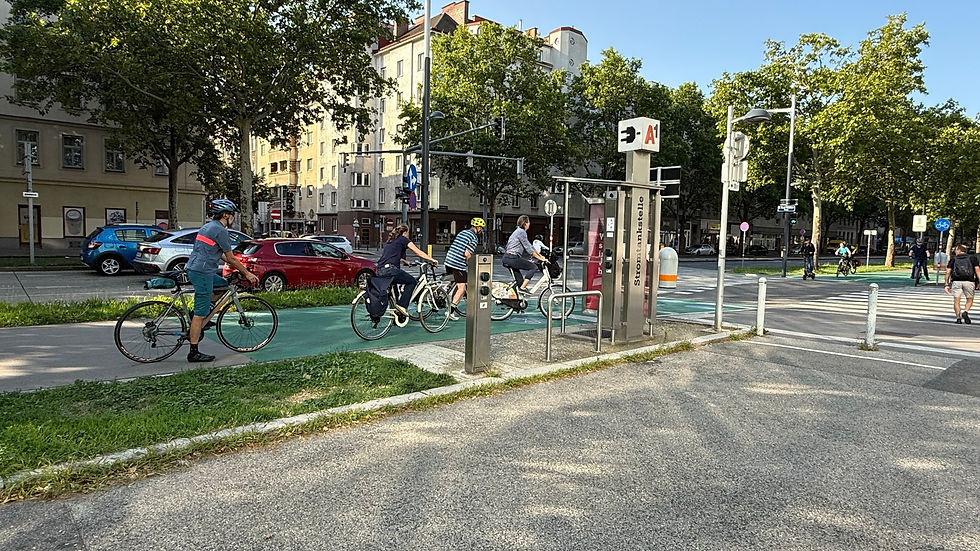
A Stroll Through Vienna: Transportation, Charm, and Everyday Life
- Brad Kaplan
- Aug 7, 2025
- 3 min read
Walking an hour from the river cruise ship to the historic center of Vienna was more than just a long walk—it was a full-on experience in how a city can work for everyone. The streets of Vienna are a living example of how transportation, green spaces, and culture can all blend together in a thoughtful, efficient, and beautiful way.
Every form of transportation you can imagine was there—bikes, e-bikes, scooters, streetcars, subways, buses, walkers

What stood out wasn’t just how many options there were—it was how well they all seemed to fit together. Dedicated bike lanes ran alongside wide sidewalks. Electric streetcars glided smoothly along their tracks without bothering pedestrians.

Scooters zipped by but stayed in their lanes. Even cars—some electric, some gas—moved politely through the city, sharing the space without taking over.

Bike rental stations were everywhere, and I passed several bike shops that carried high-end road bikes and city cruisers. There was also bike parking throughout the city. It’s clear that biking here isn’t just for fun—it’s part of everyday life. And the same goes for the subway. It’s clean, easy to use, and gets you right where you want to go, like stepping off the train and directly into the city’s main street.

Bus routes are well-marked, used daily by locals, and priced to be accessible to everyone.
Walking, though, might be the best way to experience Vienna. The sidewalks are wide and shaded by rows of trees. Benches are everywhere, inviting you to sit and relax.

Curbside cafés line the streets, offering a perfect break with coffee, pastries, or just a chance to people-watch. These spaces aren’t only for tourists—you’ll see plenty of locals enjoying them, too.

As I walked, I noticed raised white lines on the sidewalks—these are for people who are visually impaired, another example of how the city thinks about everyone.

Even the streets themselves feel like part of the experience. Narrow and winding, they make you curious about what’s around the next corner. Sometimes it’s an old butcher shop with meats hanging in the window.

Other times, it’s a flower shop, bakery, or a tiny café tucked away in a quiet alley. The smell of fresh bread drifting out of a local grocery store was unforgettable.
The mix of old and new was everywhere.

Beautiful historic buildings, some over 400 years old, stood beside modern scooter stores and hip boutiques. Fresh fruit stands and bakeries added color and delicious smells to the walk. Vienna hasn’t pushed out the past—it’s blended it with the present.

One thing that might surprise you: while many people seem fit and active from all the walking and biking, smoking and vaping are still very common. You’ll see people outside cafés and on street corners lighting up, a reminder that no place is perfect.
Still, the care the city has taken to allow for public art—even graffiti—is impressive.

Certain areas are set aside for graffiti artists to be creative legally, which seems to have reduced random tagging in other parts of the city.
At every turn, Vienna invites you to explore. Whether it’s down a cobblestone alley, into a shady park, or through a subway tunnel that opens into a lively street, the city seems to work with its people
—not against them. It's a place where transportation, nature, and culture all have a space, and everyone, no matter how they choose to move, can enjoy the journey. My final stopping point to complete this blog post. The view was stunning.



Comments